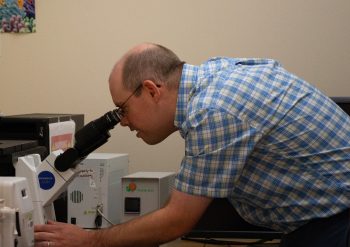FARMINGTON, ME (September 12, 2023)—University of Maine at Farmington biology professor Dr. Timothy Breton has received a highly competitive National Science Foundation research grant for $551,599.
The three-year NSF research project will begin in fall 2023 and continue Breton’s 2021 groundbreaking work on hormone receptors when he discovered a new gene with potential biomedical and commercial uses.

Breton and his team will work closely with UMF undergraduate students and Farmington’s Early College program. It will create research assistant and data analysis opportunities for both Farmington students and teachers and students from four Western Maine high schools. Breton expects to set up his lab and begin hiring student research assistants this fall. He will begin to connect with high school partners in 2024.
“Professor Breton’s research project and its funding by the National Science Foundation are a valuable investment in Western Maine. This collaborative regional partnership will provide hands-on research experience to UMF students and high school students and educators helping them develop high level, career-focused skills in the life sciences,” said Joseph McDonnell, UMF president.
Breton’s NSF project will study a family of hormone receptors found in the cell membrane of fish and humans and how they affect reproduction. Understanding these changes in fish may also lead to new research on the brain, pancreas and gut health and new commercial and therapeutic applications.
“This National Science Foundation grant is an excellent example of how small universities are able to explore interesting research questions and leverage them into further student opportunities,” said Breton.
Undergraduate students at Farmington will have the opportunity to hold paid research assistantships and be involved with cutting edge techniques such as RNA Scope and RNA-Seq to look at receptor locations inside tissues and document DNA change.

“Experience with these career-based skills is especially important as life science industries are among the fastest growing occupational areas in Maine,” said Breton.
According to a recent report by the Bioscience Association of Maine, Maine has more than 9,500 jobs in the life science sector at nearly 500 businesses—growth that is outpacing all of New England, including Massachusetts.
An essential part of the grant-funded project is the research opportunities it will create for college and high school students in rural Maine. The project is designed to provide science-minded students with cutting-edge reseach experience and to bring bioinformatics training to under-served student populations.
“I am very excited about the potential for community impact this NSF grant offers. It shows that high school teacher professional development can be coupled with hands-on student exploration of the data to break barriers associated with “big data” science and grow bioinformatics education in rural western Maine,” said Breton.
The research is also expected to generate databases that will provide hands-on research experience in computational bioinformatics to UMF and high school participants at Dirigo, Oxford Hills, Mt. Blue and Skowhegan high schools.
“This is a wonderful opportunity for our Early College partners from these high schools. Teachers will receive ongoing professional development, access to university equipment and real world research data to use with their students in the classroom.,” said Kirsten Petroska, UMF director of Early College Partnerships.

Local high school teachers involved with the UMF Early College program will be trained to leverage these databases in their biology related classes and develop independent bioinformatics modules for sustainable use.
UMF is the lead institution for the grant, which was prepared with the help of Wissen, Inc. Breton and his team will be working with colleagues Drs. Casey Murray, Matthew DiMaggio and Christopher Martyniuk from the University of Florida and two international collaborators Drs. Julien Hanson (University of Liège, Belgium) and Thanigaimalai Pillaiyar (University of Tübingen, Germany.)
This project is jointly funded by the BIO-IOS-Physiological Mechanisms and Biomechanics Program and the Established Program to Stimulate Competitive Research (EPSCoR).
More about Dr. Timothy Breton
Breton is an associate professor of biology at the University of Maine at Farmington where he teaches and conducts research in animal physiology and genomics. He is the recipient of a number of highly competitive grants, including from the National Science Foundation, the National Institutes of Health Maine-INBRE program and the Maine Economic Improvement Fund to explore a variety of questions, ranging from the genetics of local seaweed to sex change in fish and uncovering new hormone functions.
In 2021, Dr. Breton and his UMF research assistant students discovered a new gene in fish with applications to better understand reproduction and human disease. He emphasizes real research experiences for UMF students, including hands-on work in the molecular laboratory and data analysis.
Breton received a B.S. degree in Biology from Suffolk University and an M.S. and Ph.D. in Zoology from the University of New Hampshire.
More on University of Maine at Farmington
A nationally-recognized public liberal arts college known for its commitment to teacher preparation and student success, UMF provides a challenging yet supportive environment to prepare students for both careers and further study. Rooted in a tradition of teacher preparation, UMF offers top quality programs in the arts and sciences, teacher preparation, and pre-professional studies. Located in the heart of Maine’s four-season outdoor recreational region, UMF is a welcoming, close-knit academic community that prepares students for enriching professional careers, engaged citizenship and an enduring love of learning.
# # #
EDITOR’S NOTE:
Image: https://www.umf.maine.edu/wp-content/uploads/sites/1/2023/09/RP234-007A-scaled.jpg
Photo Caption: Dr. Timothy Breton
Photo Credit: UMF Image
Image: https://www.umf.maine.edu/wp-content/uploads/sites/1/2023/09/RP234-007B-scaled.jpg
Photo Caption: Breton and his team will create research assistant and data analysis opportunities for both UMF students and students from four Western Maine high schools.
Photo Credit: UMF Image
Image: https://www.umf.maine.edu/wp-content/uploads/sites/1/2023/09/RP234-007C-scaled.jpg
Photo Caption: Kirsten Petroska, UMF director of Early College Partnerships
Photo Credit: UMF Image

